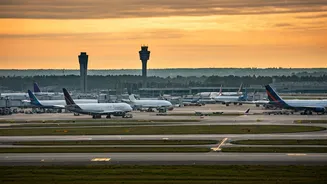Flight Cuts Announced
The US air travel sector is experiencing a significant upheaval, primarily caused by strains on the air traffic control (ATC) system. Flight reductions
have been ordered at a number of major airports, which in turn compels airlines to modify their schedules in an effort to cope with the disruptions. The Federal Aviation Administration (FAA) has been the driving force behind these actions, aiming to alleviate pressure on ATC and bolster the safety of flights. Passengers should anticipate potential delays and cancellations as a consequence of these adjustments.
ATC System Strain
The air traffic control system is under pressure, which is leading to these widespread difficulties. Several factors could be to blame, like personnel shortages, equipment failures, or heightened air traffic volumes. These challenges have a domino effect, leading to delays and cancellations. As a result, passengers across the country are facing significant travel problems. The FAA is actively working on solutions to ease the burden on the ATC system, but any immediate relief is uncertain. Travelers should check flight statuses and plan for possible disruptions.
Airlines Adjusting Schedules
In response to the FAA directives and ATC system strain, airlines are proactively making changes to their flight schedules. These adjustments include consolidating flights, rerouting, and, in some cases, outright cancellations. The aim is to reduce congestion at airports and ensure the safety and efficiency of operations. This situation leads to the need for travelers to regularly monitor flight information. Airlines are also offering travel waivers, allowing passengers to alter their bookings without incurring additional charges. Passengers must promptly contact the airlines for current flight updates and to explore any available options.
Passenger Impact Explained
The consequences of the air travel disruptions are extensive for passengers. Delays, cancellations, and schedule changes are the prevailing experiences. The impact goes beyond mere inconvenience. It can cause missed connections, lost luggage, and difficulties in reaching planned destinations. Airlines often face pressure in trying to accommodate affected passengers, whether it be by rebooking flights, providing accommodations, or offering compensation. Travelers are advised to remain informed, be patient, and cooperate with airline personnel. Passengers should be aware of their rights and the services available to them.
Ongoing Efforts to Resolve
Efforts are being made by the FAA and airlines to address the challenges in US air travel. The FAA is likely looking into ways to bolster the air traffic control staff and modernize the equipment in place. Airlines are exploring effective strategies to streamline operations and provide adequate support to affected travelers. However, the path to fully resolving these issues is not a straightforward one. It may take some time to normalize air travel again. Travellers must stay updated on the most recent developments and prepare themselves for possible ongoing disruptions.
















